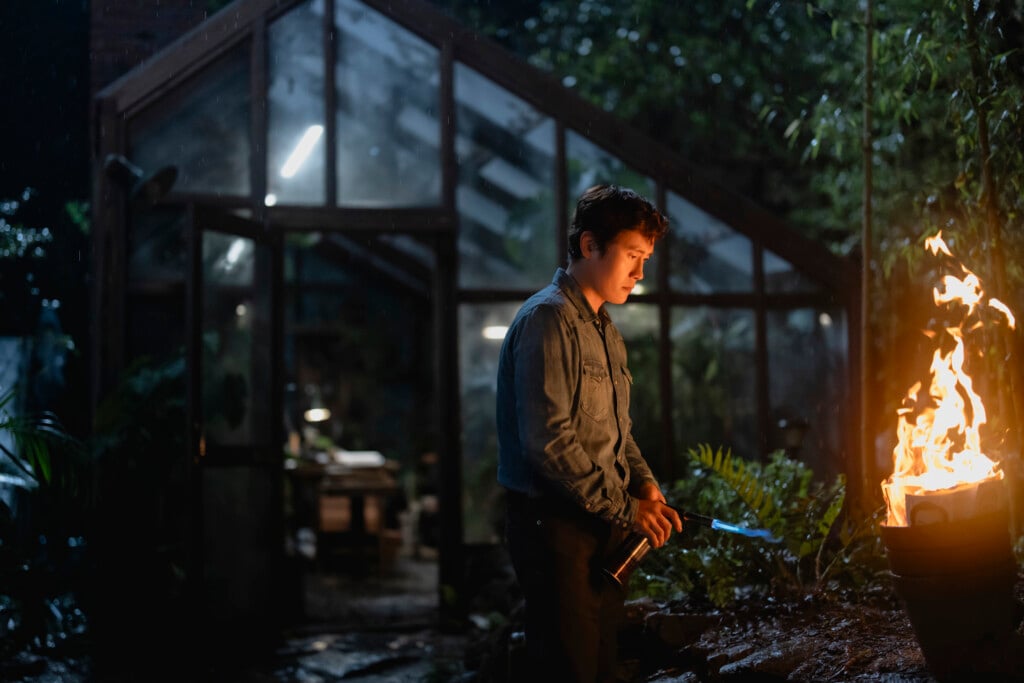Blink Twice nearly achieves cutthroat aim of dragging the rich and famous into the abyss
If Armie Hammer had a Fantasy Island—stocked with Instagram influencers—this would be their Get Out.
Zoë Kravitz’s directorial debut Blink Twice, co-written with her High Fidelity collaborator E.T. Feigenbaum, owes much of its existence to Jordan Peele’s Get Out, and a slight debt of gratitude to Emerald Fennell’s Promising Young Woman. As those reference points might imply, Kravitz’s twisty social commentary thriller isn’t the bolt-of-lightning vision its predecessors were—it’s far from an original premise. But hey, if you’re gonna steal, steal from the best.
Would-be nail artist Frida (Naomi Ackie) works at a catering company with her best friend Jess (Alia Shawkat), where the pair dream of escaping their paycheck-to-paycheck lives and cavorting alongside the wealthy clients they serve plated dinners to. Their wish appears to come true when the friends play dress-up at a charity gala hosted by recently rehabilitated millionaire tech-bro Slater King (Channing Tatum).
Slater takes a shine to Frida, and whisks her and Jess away with his entourage of famous friends to his private island. There, the group indulges in amazing food, poolside drinks and drugs for who knows how long (as in “No, seriously, what day is it?”). It’s all perfect, until it’s suddenly not. After a strange incident involving a snakebite, Jess goes missing. Frida starts noticing dirt under her fingernails, but she can’t remember picking it up. A strange woman working at Slater’s compound seems to be trying to tell her something.
But what could it be?
Where Kravitz is going with this will not be surprising — this is a movie about wealthy men mistreating women and finding new, disgusting ways to get away with it. But, as screenwriter April Wolfe likes to say, it’s not what happens but how it happens that makes a movie worth watching.
The lengths Kravitz is willing to go, and how she reveals the truth about what’s happening on the island, is a nasty, slow-moving car crash of a climax, with each new realization designed to make you slightly more nauseous.
Kravitz also gives her female characters agency in a way that makes their actions and choices feel true. We see Frida’s determination early on — she’s got just enough ambition to get suckered into a dream-turned-nightmare scenario like this. But she’s also not a dummy; her detective skills and inability to look the other way are formidable.
Formidable, too, are the survival skills of Frida’s frenemy-turned-ally Sarah (Adria Arjona). Kravitz smartly makes Sarah a former Suvivor-esque reality show competitor, a background both appropriate to the setting (Slater’s retinue contains lots of b-list celebrity hangers-on) and a source of dark comedy that Arjona plays up admirably.
Blink Twice takes a little longer setting the stage than it needs to; for all the ways Kravitz tears down her rich-and-famous characters later on, she seems to like hanging out with them a little too much to get where she needs to go.
The movie’s conclusion also muddles its sense of purpose in ways that some viewers may find intriguing and others may find unsatisfying (I’m mixed on it).
But as first films go, Kravitz’s head is in the right place and she and her co-writer have some nasty, unsparing tricks up their sleeves. It’s not the best version of the story it’s telling, but it’s also far from the worst.







